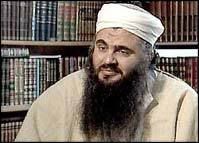The Guardian reports:
A British man held in Guantánamo Bay because of his association with the alleged militant Abu Qatada says that MI5 urged him to remain friends with the cleric so he could inform on him, according to American military documents, details of which have been learned by the Guardian.
Bisher al-Rawi, originally from Kingston upon Thames in Surrey, says MI5 reassured him that he would not get into trouble for associating with Mr Qatada.
Now Mr Qatada is accused of being a terrorist suspect and is subject to one of the government's new control orders.
Mr Rawi alleges that intelligence agents knew Mr Qatada's location when he was supposedly in hiding after the terrorist attacks of September 11 2001, because Mr Rawi had told them.
He also alleges that he acted as a "go-between" between the radical cleric and MI5 when the authorities were saying they did not know where the alleged militant was.
Mr Qatada has been branded as Osama bin Laden's right-hand man in Europe. A video of his sermons was found in the Hamburg flat of Mohammed Atta, the leader of the September 11 hijackings.
The startling claims from Mr Rawi came during a hearing at Guantánamo Bay last year. Key sections had been kept classified by the US military authorities, and are revealed here for the first time.
Mr Rawi was arrested in Gambia while on a business trip, before being interned in Guantánamo Bay without charge or trial.
The British government has refused to represent him, because he is an Iraqi citizen, despite his many years of residence in London. His family, who are British citizens, fear that he may be released from Guantánamo only to be sent to Iraq. His American lawyers have sought an injunction to stop this.
Mr Rawi told the US military panel that he had translated for Mr Qatada, a Palestinian refugee, when he had several meetings with officials from either the British Intelligence Service or the British police: "During a meeting with British Intelligence, I had asked if it was okay for me to continue to have a relationship with Abu Qatada? They assured me it was. They just wanted to understand more about Abu Qatada and the community."
In a letter to the US panel, Mr Rawi said MI5 agents had reassured him that his relationship with Mr Qatada would not get him into trouble. "[I asked] whether it is okay to have, and continue to have a relationship with Abu Qatada? The answer was always yes. The British authorities knew of my assistance to Abu Qatada ... and it was to their advantage."
Mr Rawi called three MI5 officers he said he had contacts with for his Guantánamo hearing. The chairman of the US military tribunal said the British government had refused to cooperate. "We have contacted the British government and at this time, they are not willing to provide the tribunal with that information," the chairman said.
After the September 11 attacks, the British government passed laws allowing it to detain foreign terror suspects without charge.
Mr Qatada, who feared that he would be a target, went on the run, with the British authorities supposedly unable to find him for 10 months.
But Mr Rawi claims that intelligence agents knew exactly where Mr Qatada was. "When he disappeared I received a call from the British Intelligence Agency asking if I knew where Abu was ... I told them I did.
"I took a role as a go-between for the British Intelligence Agency and Abu Qatada," Mr Rawi said. "During the time he was supposedly in hiding from them, the British authorities knew where Abu was and they used it to their advantage."
In a Guardian interview 18 months ago, Mr Rawi's brother Wahab freely admitted that he and Bisher had assisted Mr Qatada while he was on the run.
Wahab al-Rawi said that when they were being interrogated by US agents in Gambia after they were first arrested, one US agent asked if his brother worked for British intelligence.
A number of Muslims in London doubted that the UK authorities could not find Mr Qatada when he was supposedly on the run from December 2001 to October 2002, in part because so many Muslims here knew where he was.
According to one report, this was a view shared by French intelligence, which claimed that the British secret services were shielding the cleric.
Mr Rawi told the US military panel: "My relationship with MI5 ended some time mid-summer 2002. A few months had passed before Abu Qatada was arrested. During that time, I saw Abu Qatada on a regular basis. If Abu Qatada was such a danger, why wasn't he arrested before? I am positive the British Intelligence knew where he was, because I told them."
Asked about Mr Rawi's allegations, the Home Office said: "We would not be able to comment on security matters."
By turning the war on terror into a military operation (where those who are apprehended are tried by secret military tribunals) instead of a law enforcement operation (where those arrested are prosecuted in public trials), corrupt governments are able to railroad and frame innocents, bury evidence of their own wrongdoing, and keep the citizens of a democracy in the dark. The founders of the U.S. never intended this, and terrorism is no reason to dismantle the Constitution.

Terrorist acts are crimes. Investigatable and prosecutable, no different than any other crime. No different than the bombing of the Murrah federal building in Oklahoma City, which didn't require shredding the Constitution and holding secret tribunals offshore to bring those responsible to justice.

